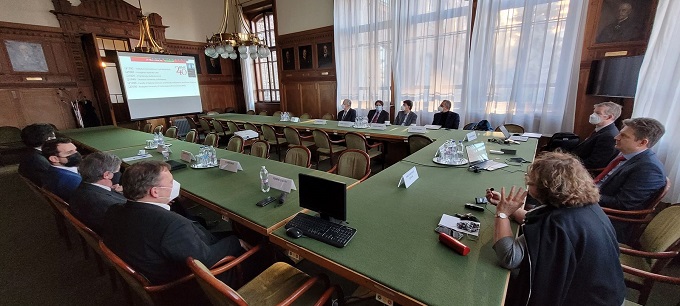News feed
BME TTK’s nuclear technology programmes first to be reviewed by the IAEA
2022. 01. 17.BME is first in the world to welcome the IAEA’s highest-level knowledge management mission. The academic programmes received commendable evaluations.
Between 14-17 December 2021, BME’s Faculty of Natural Sciences (TTK) hosted a delegation of experts from the International Atomic Energy Agency (IAEA) to review the university's nuclear-related BSc and MSc courses. BME is the first university in the world to host a Level 3 IAEA Knowledge Management Assist Visit. This type of mission is offered by the International Atomic Energy Agency to countries with the most advanced nuclear programmes. By reviewing BME's training programmes, the Agency aims not only to support the host university, but also to gather international good practices to support similar programmes in universities in other countries.
Prior to the four-day mission, which was held in a hybrid (in person and online) format, the Institute of Nuclear Techniques at BME’s Faculty of Natural Sciences compiled a complex information package on the nuclear energy specialisation of its BSc and MSc programmes in Energy Engineering, as well as on the recommended curricula, subjects, admission data, output successes and course characteristics of the Nuclear Technology subject group in the Applied Physics Specialisation within the BSc in Physics programme, the Nuclear Technology Specialisation and Medical Physics Specialisation of the MSc in Physics programmes. In addition to the Head of Mission of the International Atomic Energy Agency, the international delegation included an expert from Imperial College London in the UK and an expert from the University of West Bohemia in the Czech Republic.

Attila Aszódi, Dean of BME’s Faculty of Natural Sciences, spoke about the delegation's experiences: “After reviewing written documents, having personal interviews with senior lecturers and students, and conducting laboratory visits, the international experts concluded that BME’s nuclear technology programmes are of impressive depth and breadth, providing students with a very high quality and well-structured nuclear technology education.” The Dean added: “The preliminary assessment shows that BME’s students studying nuclear engineering are acquiring the competences required by the nuclear industry. The international experts particularly appreciated the educational and research benefits of having an on-campus training reactor, saying that the importance of students having access to a working training reactor on the BME campus cannot be overemphasised.”
Based on the conclusions of the visit, the international experts are of the opinion that nuclear education at BME is conducted with a high number of contact hours, which allows for the high quality preparation of students. They advised that BME should increase the international visibility of its nuclear training programmes and suggested further developing the use of alumni networking opportunities.
A similar IAEA university support mission (Knowledge Management Assist Visit Level 3) is expected to take place in the coming period at a number of leading universities in the West.

BME's nuclear education programmes were already recognised in 2020: the University of Technology was the seventh university worldwide to receive the International Atomic Energy Agency’s (IAEA) endorsement for its nuclear technology management programme. The role played by BME's training reactor in the academic programmes was highlighted in June 2020, as well as in 2021, when celebrating the 50th anniversary of the inauguration of this unique teaching and research facility, attended by industry and government partners, as well as international and national experts.You can take a virtual tour of the training reactor by watching these two videos (video1, video2).
BME TTK - Rector's Office, Communication Unit
